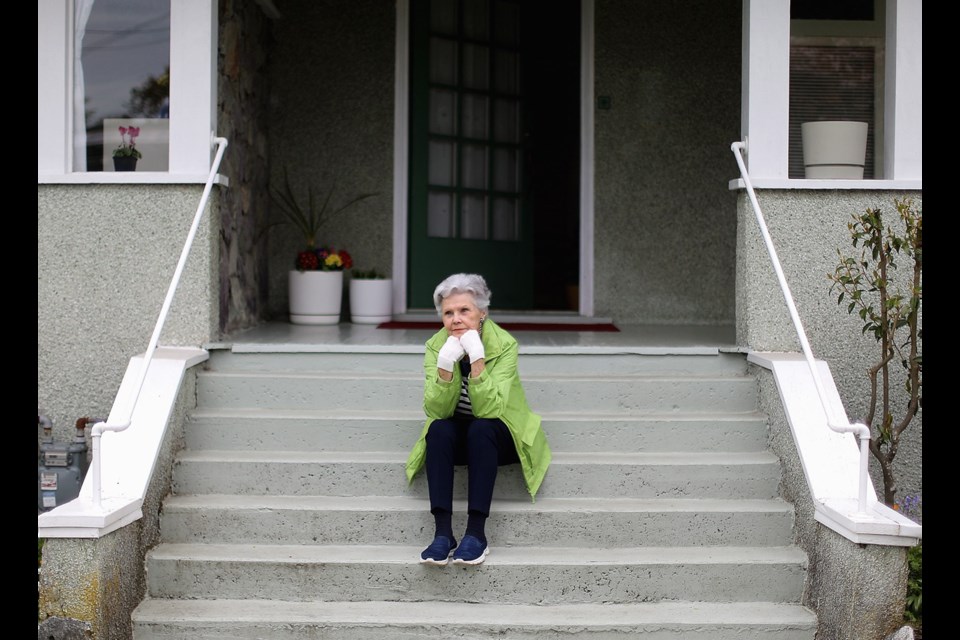Dee van Straaten is tossing out sentimental letters going back years as she packs up the Fairfield rental house she has called home for nearly three decades.
The house has been sold to new owners who plan to move in on May 31, leaving van Straaten, 75, searching for a new home amid the COVID-19 pandemic.
She knows public-health officials are recommending that seniors minimize their time outside and is nervous about increasing her risk of catching the virus by going out house-hunting.
“The more you’re out into the community, the greater your chances,” she said.
Advocates say there are many people in a similar position, despite measures to protect renters from evictions during the public-health emergency.
The province put a freeze on issuing new eviction notices effective March 30, with exceptions in extreme situations in which the tenant poses a serious safety risk and it wouldn’t be reasonable to wait to evict the person.
Even renters facing eviction notices issued before the end of March can’t be ousted from their homes while the province remains in a state of emergency, according to the Ministry of Municipal Affairs and Housing.
“If an eviction notice was already issued before March 30th, it will not be enforced during the ongoing state of emergency and renters can stay in their homes at this time,” the ministry said in an email.
The province’s state of emergency was extended last week until April 28. The B.C. government can continue extending that declaration for up to 14 days at a time, meaning the freeze on evictions doesn’t offer much relief to those in van Straaten’s position.
“I have to carry on as if I’m moving May 31 because if they end the emergency before the 31st, I have to move,” van Straaten said.
Together Against Poverty Society, an advocacy organization that helps people with tenancy issues, is still receiving one or two calls each week from renters who have been issued eviction notices, down from about six weekly calls before the pandemic.
The notices aren’t valid and can’t be enforced, but some renters are worried their housing is at risk, said Hannah Mang-Wooley, a tenant legal advocate at the society. “People are really nervous,” she said.
Mang-Wooley thinks landlords might not realize they’re not allowed to issue eviction notices right now, because some of the messaging has been confusing. Part of her job is to help them understand the notice has no effect. “We have to contact the landlord and tell them it’s not valid. We still have some landlords trying to dispute that,” she said.
David Hutniak, CEO of LandlordBC, said the organization hasn’t heard from landlords who are confused by the new measures, but he imagines anyone still issuing eviction notices is unaware they’re not allowed.
He suggested that tenants contact the Residential Tenancy Branch or ask their landlord to approach it to better understand the situation.
Uncertainty about how long the COVID-19 crisis could last, and whether there will be any grace period once the state of emergency lifts and before evictions are enforced, means the risk of homelessness at the end of the pandemic still looms for many.
Mang-Wooley said there hasn’t been any direction from the government about what will happen when the state of emergency ends. “There could be a number of people with evictions facing 48 hours to get out. The [residential tenancy] branch doesn’t know,” she said.
The ministry said its focus in recent weeks has been on responding to immediate needs and it understands there will be a need for transition measures to support people when the state of emergency ends.
“We’re reviewing those now,” a ministry statement said.
Some people are not covered under the new measures, such as those who live with their landlords or with roommates and just one of them holds the lease.
Ted Edwards is losing his home next week and has nowhere to go.
He was living with his mother as her caregiver in subsidized housing, but when she went into long-term care last month, Edwards learned he would have to move, because his mother had the lease for the unit and there’s a formal process to get into the housing.
Edwards, who is on oxygen for chronic obstructive pulmonary disease, is worried about becoming homeless. “Sick to your stomach,” he said. “There’s not much you can do about it. You’re out on the street.”
The federal NDP wants Ottawa to put a moratorium on rent and mortgage payments during the COVID-19 crisis.
Victoria MP Laurel Collins said she has heard from residents concerned they will fall behind on rent payments and won’t be able to pay their debt when the crisis ends. “So many Canadians are one paycheque away from losing the roof over their head. Four months of piling up of rental debt isn’t really manageable for them,” Collins said.
Although some banks are allowing for flexibility with mortgage payments, Collins said deferring payments will result in more debt for homeowners in the long run, which discourages people from taking advantage of payment deferrals and passing on rent reductions to tenants.



